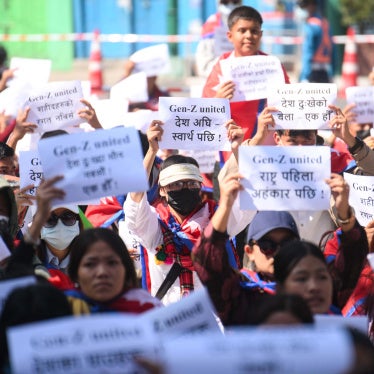(New York) - The Nepalese government's public pledge to uphold human rights and the laws of war in its fight against the Maoist insurgency is a welcome step, but implementing this commitment requires a strong plan of action, Human Rights Watch said today. Human Rights Watch urged the Maoist guerrillas to make an equivalent public pledge and implement it.
"The Nepalese government's pledge to improve its human rights record is a welcome step," said Brad Adams, executive director of the Asia Division of Human Rights Watch. "But without a specific plan of action, its promises will amount to little more than diplomatic posturing."
Since the civil war flared up again in late 2003, credible reports suggest that hundreds-and perhaps thousands-of civilians have been killed amid fighting between the Nepalese army and the armed forces of the Communist Party of Nepal (Maoist), or CPN (Maoist). The Royal Nepal Army has carried out extrajudicial killings, arbitrary arrests and "disappearances" of villagers, as well as members of the CPN (Maoist). The army has also harassed and intimidated the press and human rights workers, and interfered in the work of the judiciary.
The CPN (Maoist) has also killed large numbers of civilians, threatened and executed non-Maoist political activists and party members suspected of disloyalty, and engaged in widespread extortion and abductions.
Both sides have been under pressure from the international community to sign a national human rights accord proposed by Nepal's National Human Rights Commission (NHRC). However, this discussion was put on hold last year during a temporary ceasefire. In lieu of the accord, and under continued international pressure, the Nepalese government recently published a unilateral "commitment paper" renewing its pledge to abide by its international obligations. The commitment paper was timed to avoid expected criticism from European governments at the U.N. Commission on Human Rights, which is currently holding its annual session in Geneva.
"The U.N. Commission on Human Rights should pass a resolution on Nepal that clearly expresses its concerns about abuses by the government and Maoists, and its expectation that the government moves from words to concrete action," said Adams. "The resolution also needs to authorize U.N. human rights workers to assist the National Human Rights Commission in its work."
Human Rights Watch urged the Nepalese government to enable the National Human Rights Commission to create an independent mechanism to monitor violations. It should also fulfill its pledge to guarantee the commission all necessary external assistance, including U.N. expert assistance, to establish such a mechanism.
An impartial and adequately staffed monitoring mechanism, under the aegis of the National Human Rights Commission and supported by the United Nations, is crucial in the current climate in Nepal, where government forces and Maoists routinely operate outside the law and ignore court orders. The Nepalese Supreme Court has recently condemned the army's extensive disregard of its habeas corpus orders issued in response to the military's widespread practice of abductions and arbitrary arrests.
Human Rights Watch welcomed the Nepalese government's commitment to provide proper and ongoing training to its soldiers on the laws and customs of war, as well as its pledge to ensure that its soldiers' rules of engagement will be in accordance with the laws and customs of war.
"The next step is to bring perpetrators of violations to justice, whether they are in the army, police or any other government department," said Adams. "This will build confidence among Nepalese and the international community that this time the government is serious about its commitments. This is now a question of political will."
Human Rights Watch urged the international community--particularly the United States, the United Kingdom, India and other countries that have provided military assistance to Nepal--to press the Nepalese government to take steps to ensure greater accountability for rights violations and the implementation of international humanitarian law.
"The international community must press hard to end the cycle of impunity in Nepal," said Adams. "Foreign governments that provide military assistance to Nepal must not ignore the very serious violations that have been committed with that weaponry."
Human Rights Watch called on the CPN (Maoists) to sign their own commitment paper, detailing their undertaking to protect the rights of civilians and combatants. Human Rights Watch further called on the CPN (Maoists) to commit to open and full cooperation with the National Human Rights Commission's monitoring and reporting mechanism, even where allegations relate to abuses committed by the party or forces under its control.
"The Maoists seem to think that human rights violations in pursuit of their political goals are acceptable," said Adams. "They are not, and as the rule of law is built in Nepal they will find themselves further marginalized if they don't take the rights of Nepalese seriously."






